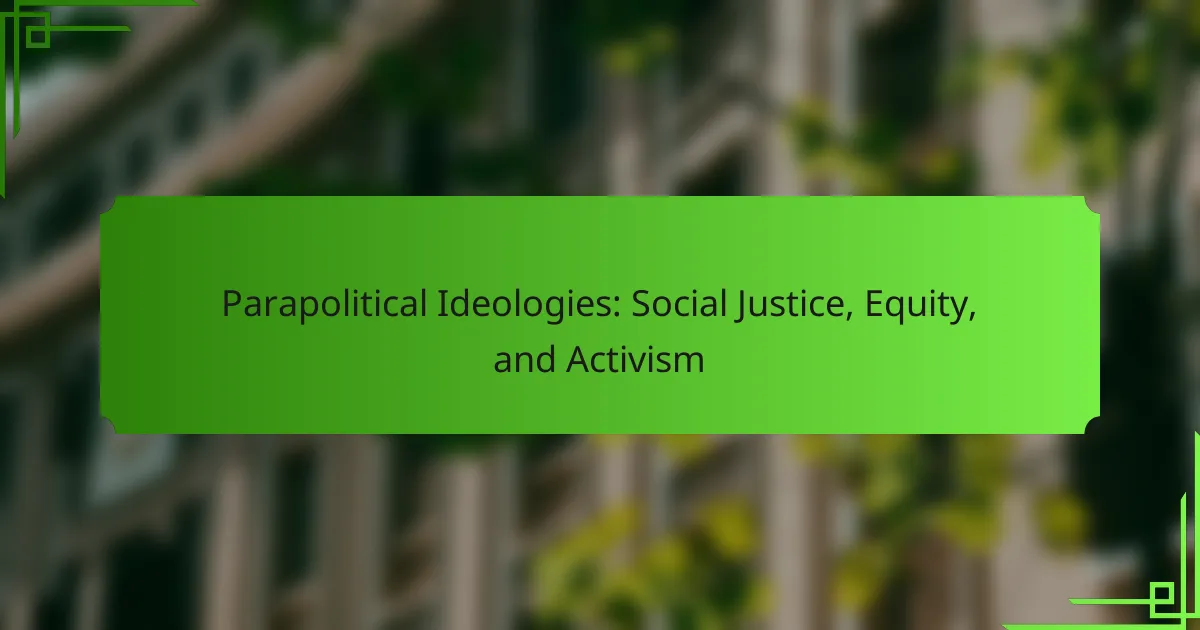Parapolitical ideologies centered around social justice, equity, and activism play a crucial role in shaping societal change. These movements, exemplified by organizations like Black Lives Matter, raise awareness of systemic inequalities and mobilize communities to advocate for policy reforms. By fostering inclusive participation and community engagement, they aim to create a more equitable society for all. Through collective action, these ideologies challenge existing norms and strive for meaningful transformation in public policy.
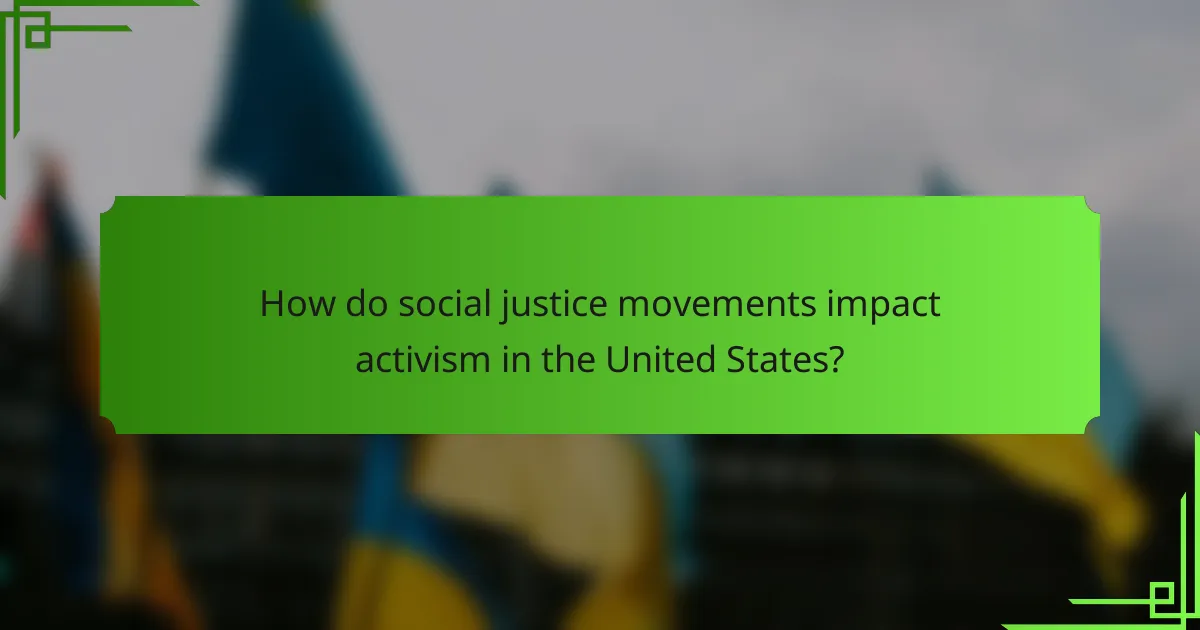
How do social justice movements impact activism in the United States?
Social justice movements significantly shape activism in the United States by raising awareness of inequalities and mobilizing diverse groups to advocate for change. These movements often lead to collective action that influences public policy and societal norms.
Increased awareness of systemic inequalities
Social justice movements highlight the existence of systemic inequalities related to race, gender, and economic status. By using various platforms, activists educate the public about issues such as police brutality, income disparity, and access to healthcare.
For example, campaigns like Black Lives Matter have brought national attention to racial injustices, prompting discussions in schools, workplaces, and communities. This heightened awareness encourages individuals to recognize their own biases and the structural barriers faced by marginalized groups.
Mobilization of diverse communities
These movements effectively mobilize a wide array of communities, uniting individuals across different backgrounds to advocate for common causes. This coalition-building is crucial for amplifying voices that are often overlooked in mainstream discourse.
Events such as marches and rallies serve as platforms for diverse groups to express solidarity. For instance, the Women’s March has drawn participants from various demographics, emphasizing the intersectionality of issues like gender equality and racial justice.
Influence on policy changes
Social justice movements play a critical role in influencing policy changes at local, state, and national levels. Activists often engage in lobbying efforts, public campaigns, and grassroots organizing to push for legislative reforms.
Notable examples include the push for criminal justice reform and the implementation of policies aimed at reducing income inequality. As a result, some cities have adopted measures such as increased minimum wage laws and enhanced police accountability standards, reflecting the demands of these movements.
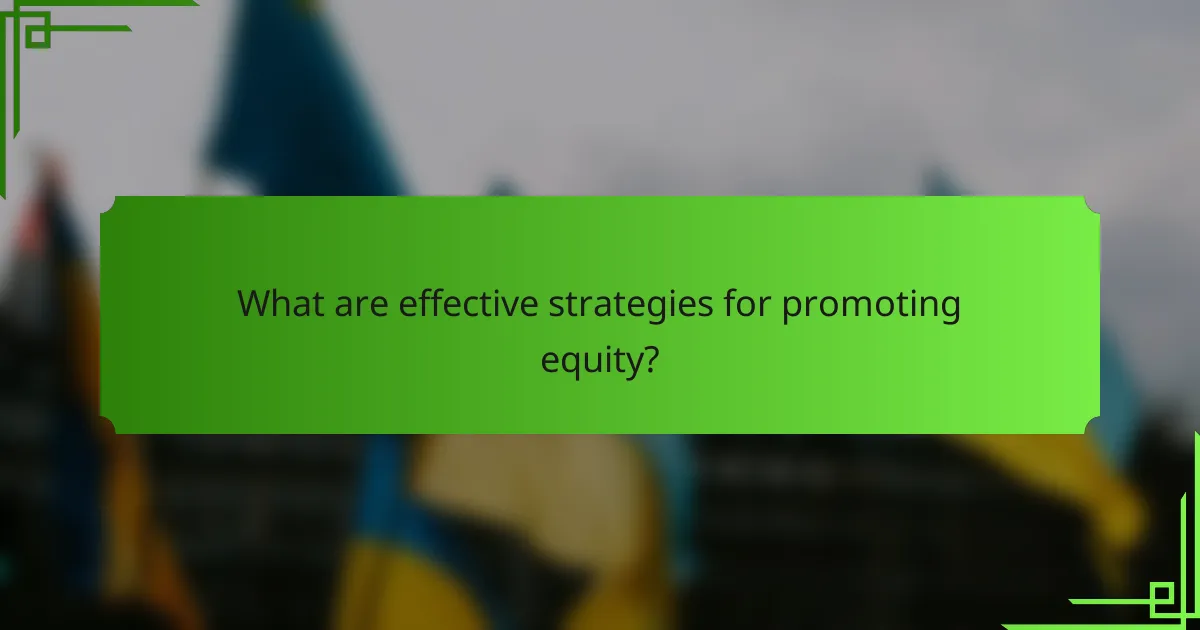
What are effective strategies for promoting equity?
Effective strategies for promoting equity involve community engagement, inclusive policy advocacy, and education initiatives. These approaches aim to create a fairer society by addressing systemic inequalities and fostering participation from diverse groups.
Community engagement initiatives
Community engagement initiatives focus on involving local populations in decision-making processes. This can include town hall meetings, focus groups, and participatory budgeting, where residents have a say in how public funds are allocated.
To be successful, these initiatives should prioritize underrepresented voices and ensure that all community members feel welcome to participate. Creating a safe space for dialogue can help build trust and encourage collaboration.
Inclusive policy advocacy
Inclusive policy advocacy aims to influence legislation and regulations that promote equity. This involves working with policymakers to draft laws that address disparities in areas such as housing, education, and healthcare.
Advocates should gather data to support their positions and engage with affected communities to understand their needs. Building coalitions with other organizations can amplify efforts and create a stronger voice for change.
Education and awareness campaigns
Education and awareness campaigns are essential for informing the public about equity issues. These campaigns can take various forms, including workshops, social media outreach, and informational materials that highlight the importance of equity.
Effective campaigns should tailor their messaging to resonate with different audiences, using relatable examples and clear calls to action. Collaborating with schools and community organizations can enhance reach and impact.
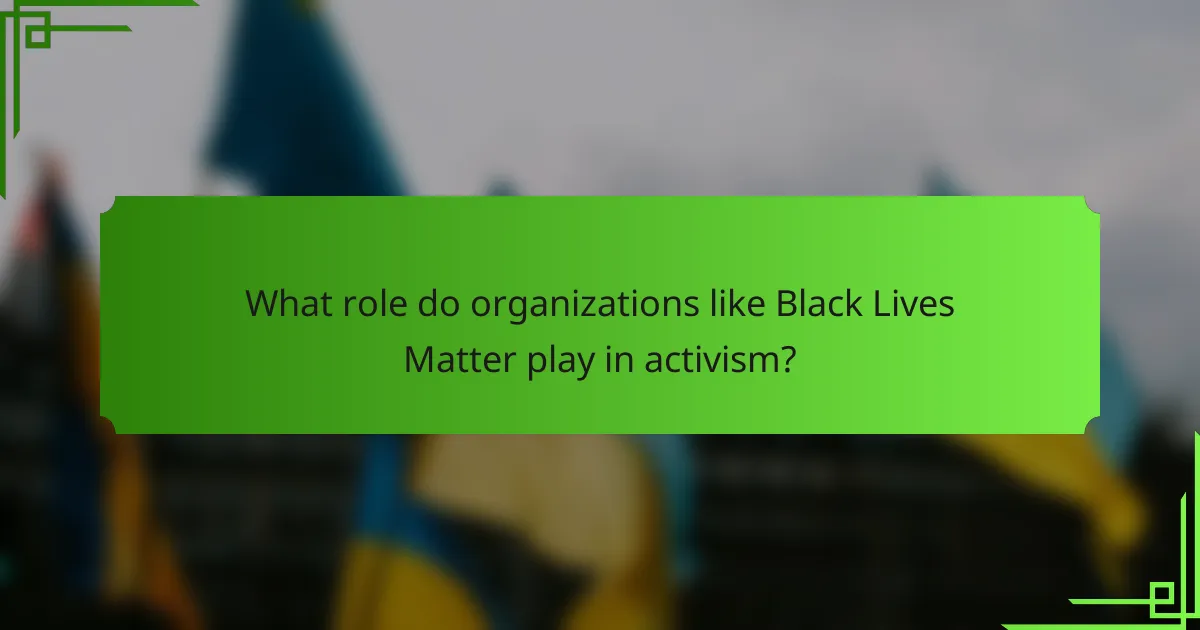
What role do organizations like Black Lives Matter play in activism?
Organizations like Black Lives Matter (BLM) are pivotal in modern activism, focusing on social justice and racial equity. They mobilize communities, raise awareness, and advocate for policy changes to address systemic inequalities.
Grassroots mobilization
Grassroots mobilization is a fundamental aspect of organizations like BLM. They engage local communities through rallies, protests, and educational events, empowering individuals to voice their concerns and participate actively in social change. This bottom-up approach fosters a sense of ownership among community members.
For effective grassroots mobilization, organizations often utilize social media platforms to organize events and spread their message quickly. This allows for rapid responses to incidents of injustice, creating a network of support that can rally in real-time.
National and global awareness
Organizations such as BLM significantly enhance national and global awareness of social justice issues. By leveraging media coverage and online campaigns, they bring attention to systemic racism and inequality, prompting discussions that extend beyond local communities. This increased visibility can lead to broader societal engagement.
For instance, high-profile events and viral social media campaigns can spark international solidarity, as seen during protests that gained traction worldwide. This global awareness can pressure governments and institutions to address these critical issues more urgently.
Policy influence and reform
Policy influence and reform are key objectives for organizations like BLM. They advocate for legislative changes that address racial disparities and promote equity. This includes lobbying for reforms in policing, criminal justice, and education systems to create more just environments.
Successful campaigns often involve collaboration with lawmakers and community leaders to draft and support legislation. For example, initiatives aimed at banning chokeholds or implementing community oversight boards reflect direct responses to demands from activist organizations.
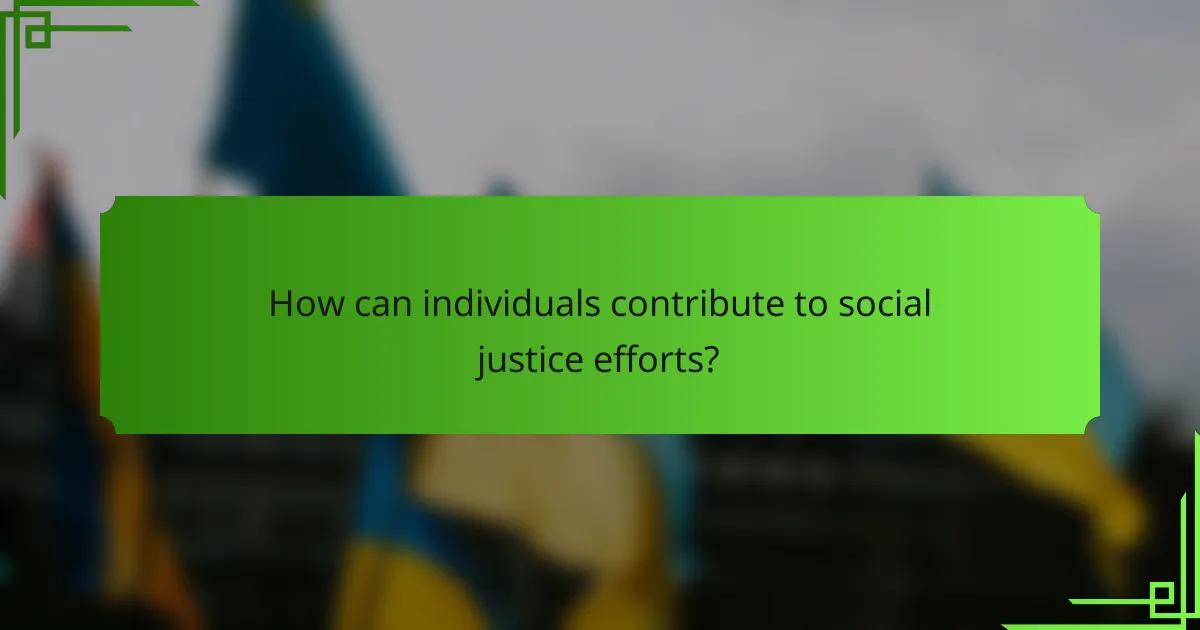
How can individuals contribute to social justice efforts?
Individuals can contribute to social justice efforts by actively engaging in community initiatives, advocating for equitable policies, and supporting marginalized groups. These actions help create a more just society and empower those who face systemic inequalities.
Volunteering with local organizations
Volunteering with local organizations is a direct way to support social justice initiatives. Many nonprofits focus on issues like housing, education, and healthcare, and they often rely on volunteers for various tasks, from administrative support to direct service roles.
Consider dedicating a few hours each month to local shelters, food banks, or advocacy groups. Research organizations in your area that align with your values, and reach out to see how you can help. Websites like VolunteerMatch can connect you with opportunities nearby.
Participating in peaceful protests
Participating in peaceful protests is a powerful method for individuals to express their support for social justice causes. These gatherings raise awareness and can influence public opinion and policy decisions.
Before attending a protest, familiarize yourself with the cause and the specific issues being addressed. Bring necessary supplies, such as water and comfortable clothing, and ensure you understand the local laws regarding public demonstrations to stay safe and compliant.
Supporting minority-owned businesses
Supporting minority-owned businesses is a practical way to promote economic equity and social justice. By choosing to shop at these establishments, you help create jobs and foster community development in underrepresented areas.
Look for local directories or online platforms that highlight minority-owned businesses in your community. Consider making a conscious effort to purchase goods and services from these businesses, whether it’s dining at a restaurant or shopping at a boutique. This not only supports their growth but also contributes to a more diverse economy.

What frameworks exist for understanding parapolitical ideologies?
Parapolitical ideologies, such as social justice, equity, and activism, can be understood through various frameworks that analyze power dynamics and social structures. These frameworks help to dissect the complexities of societal issues and advocate for systemic change.
Intersectionality in social justice
Intersectionality is a framework that examines how various social identities—such as race, gender, class, and sexuality—intersect to create unique modes of discrimination and privilege. This approach emphasizes that individuals experience oppression differently based on their overlapping identities.
For example, a Black woman may face challenges that are distinct from those encountered by a white woman or a Black man. Understanding these intersections is crucial for developing effective social justice strategies that address the specific needs of diverse groups.
Critical race theory
Critical race theory (CRT) is an analytical framework that examines the relationship between race, law, and power. It posits that racism is not just an individual bias but a systemic issue embedded in legal and social institutions. CRT encourages the exploration of how laws and policies perpetuate racial inequalities.
In practice, CRT can inform discussions on issues like affirmative action and criminal justice reform, highlighting the need for policies that actively dismantle systemic racism. It also emphasizes the importance of storytelling and personal narratives in understanding the lived experiences of marginalized communities.
Feminist theory
Feminist theory critiques the ways in which gender influences social structures and power dynamics. It seeks to understand the roots of gender inequality and advocates for women’s rights and gender equity across various spheres, including politics, economics, and culture.
Feminist theory encompasses various perspectives, including liberal feminism, which focuses on legal equality, and radical feminism, which addresses deeper societal issues related to patriarchy. By analyzing gender through different lenses, feminist theory aims to create a more equitable society for all genders.
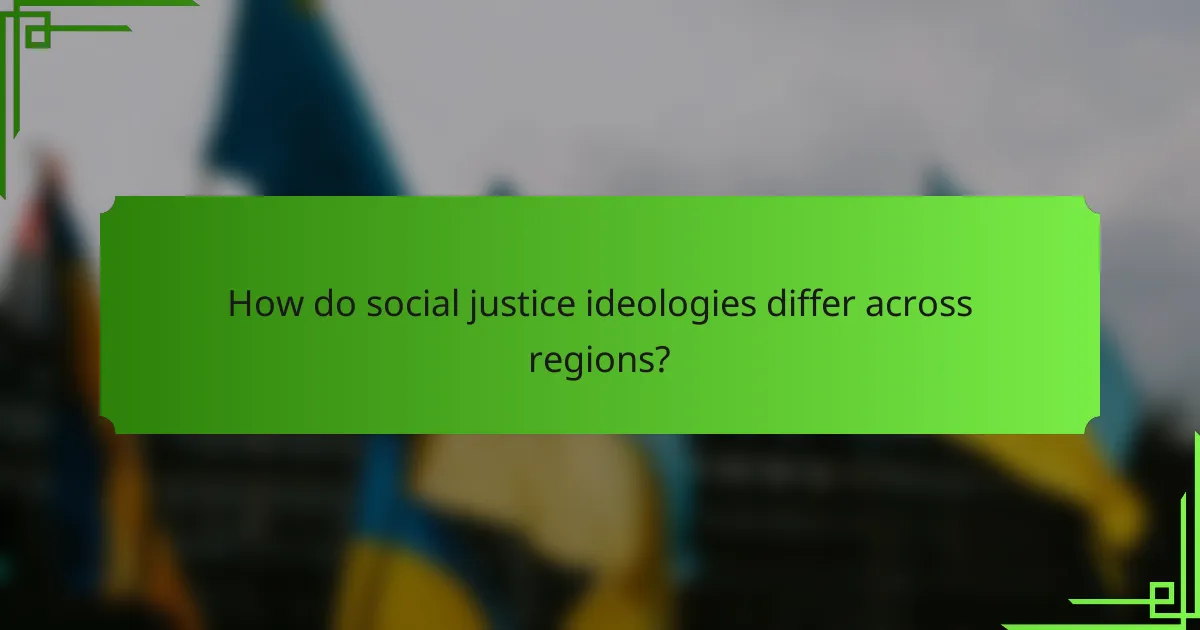
How do social justice ideologies differ across regions?
Social justice ideologies vary significantly across regions due to cultural, economic, and political factors. These differences influence how communities perceive equity and activism, shaping local movements and priorities.
Variations in activism in urban vs. rural areas
Activism in urban areas often focuses on systemic issues such as racial inequality, police reform, and access to healthcare, driven by diverse populations and greater visibility of social issues. In contrast, rural activism may prioritize concerns like agricultural policies, land rights, and local economic development, reflecting the unique challenges faced by these communities.
Urban activists typically leverage social media and organized protests to mobilize support, while rural activists might rely on community meetings and local networks to foster engagement. Understanding these differences is crucial for effective advocacy in each setting.
Regional historical contexts
The historical backdrop of a region significantly shapes its social justice ideologies. For instance, areas with a legacy of colonialism may focus on decolonization and reparative justice, while regions with a history of labor movements might emphasize workers’ rights and economic equity.
Additionally, the impact of past civil rights movements can influence current activism strategies. Regions that have experienced significant social upheaval may have more established frameworks for advocacy, while others may still be developing their approaches to social justice.
